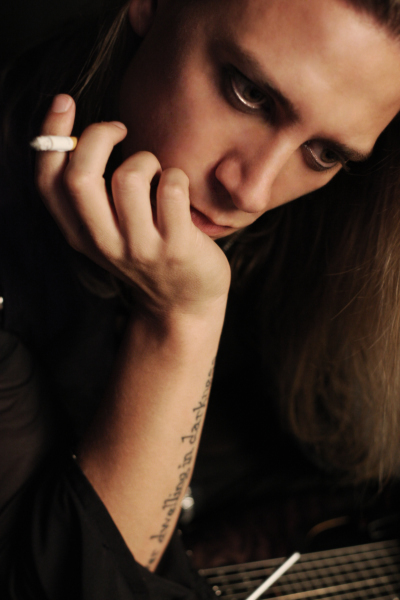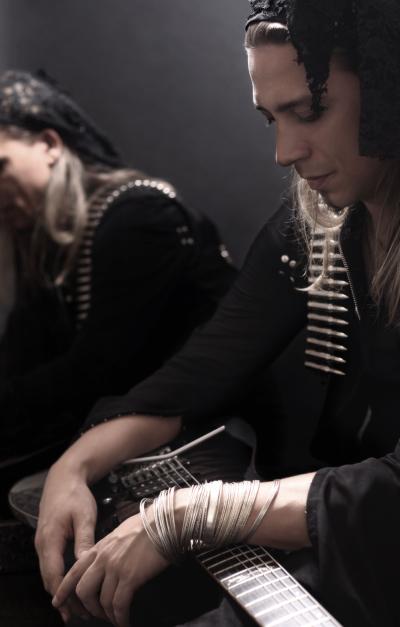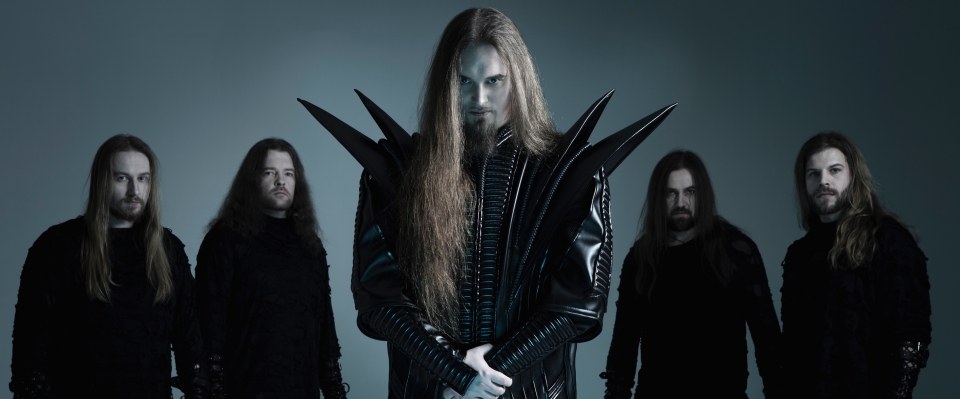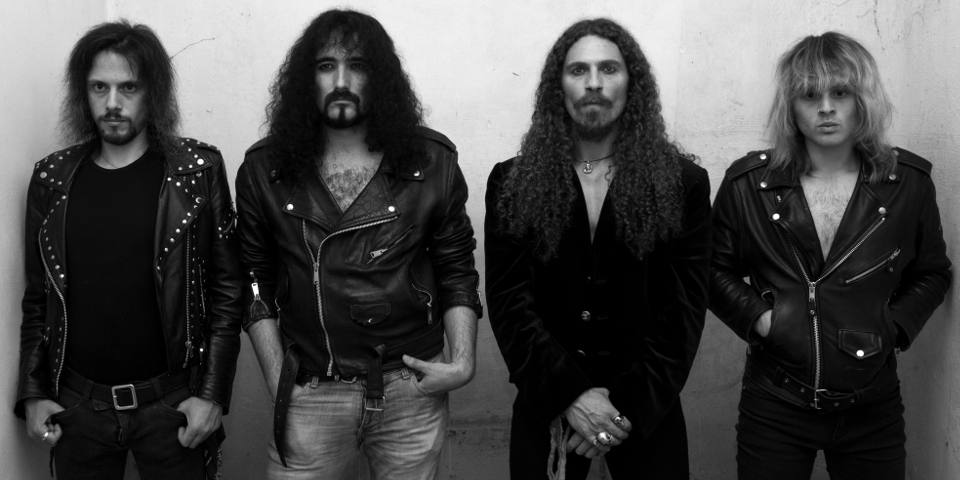by Alissa Ordabai
Staff Writer —
The best things in rock happen when an artist – while being fiercely individual – still relies on a long-established tradition. The allure of the unexpected and the comfort of the familiar, the mixture of something fresh but at the same time accessible on the one hand flings the door wide open, and on the other – gives you the thrill of the new. Think of the way Hendrix, Led Zeppelin and the Stones have taken the blues for their initial prototype. Or the way Metallica channelled discoveries of their predecessors Diamond Head and Venom into a new dimension. Or the way Steve Vai propelled into the stratosphere what he had received from Frank Zappa and Joe Satriani.
Adagio guitarist Stéphan Forté – either consciously or purely intuitively – delivers exactly this kind of combination of the original and the well-known on his debut instrumental album The Shadows Compendium (click here to read the review). His whirlwinds of rapid-fire notes, explosive riffling, and dramatic, expansive songwriting borrow from the neo-classical guitar icons of the Eighties, but at the same time project a boldly personal vision which has no precedent in rock. Or at least Forté bewitches you to believing that it doesn’t with his grand-scale compositional ideas, flamboyant juxtapositions of moods, and the way he conveys the most exalted messages way beyond the pathos Jason Becker or Marty Friedman have ever allowed themselves.
But what is also clear is that beneath the audacity of his swaggering chops and all the guitar hero ambitions, Forté’s inner realities are more important to him than the medium. The fact that he chooses to realise himself within the neo-classical tradition helps listeners to acclimatise in his universe, but also serves as a reliable peg for Forte himself to hang his explorations and extrapolations on.
In disregard for what current fashions dictate to young musicians, as well as in defiance of the mainstream’s indifference toward rock in his native France, Forté sticks by his inner convictions which made him grow as a musician in spite of what his environment had (or didn’t have) to offer. With a sharp focus on the ultimate goal translating into the way Forté approaches his instrument and his songwriting, his debut record didn’t go unnoticed – just like any other work or art which combines authenticity and mastery. The ostentatiously dramatic universe he creates on The Shadows Compendium turned out to be convincing enough for people to sit up and listen – even those outside of the usual guitar aficionado circles.
Catching up with Stéphan Forté just a few days before the official release of the album, Hardrock Haven learned about the young virtuoso’s songwriting process, this approach to the guitar, and the journey which took him from his beginnings in a French town of Montpellier to the world stage he is about to start conquering.
 Hardrock Haven: Stéphan, congratulations on the new record. What a great album.
Hardrock Haven: Stéphan, congratulations on the new record. What a great album.
Stéphan Forté: Thank you.
HRH: Are you happy with the way it turned out?
SF: Yes, I’m pretty surprised, actually, by the result so far. I wasn’t expecting any enthusiasm about it because I was just doing it for myself without any compromises. So I’m definitely happy.
HRH: It’s interesting you say you did it for yourself, because my initial thought was that this is such a clever record. On the one hand it appeals to all the guitar enthusiasts, and on the other hand it appeals to the general public, because despite all the flashy chops it also has great melodies that appeal to people on a general level. So I was going to ask you if you had to sit down and really think about balancing being accessible on the one hand expressing yourself on the other.
SF: Thank you. But this is what I really did for myself.
HRH: So you must enjoy sitting down and writing proper music. A lot of guitar-oriented records are very much about guitar doodles and showing off speed and technique, whereas this record shows that you like a good melody. And you like a good harmony as well.
SF: Yeah, indeed. With Adagio right now – with the management and the label – I have to think of some kind of structure which is less progressive, easier to listen to, and more straightforward. And I just needed to do something I really wanted to do with all those melodies and just reflecting my heavy mind. So I really did it.
HRH: How do musical ideas come to you? Do you have to lock yourself in a room, switch off your mobile, etc., or do they come to you as you go about your daily business?
SF: I try to sit down, and yeah, lock myself in a room, writing everything down and focusing on trying to find ideas. The first thing I try to do is deciding about the tempo and the type of vibe I want for the song. If it is going to be a really heavy song, mid-tempo or something really fast or really dark. And once I have the mood in mind, I am playing around trying to find the riff, and once I have the riff, I am putting down roughly the drums and the bass, and then playing over it looking for ideas, keeping the right ideas and throwing away the rest. That’s how I’m doing it.
HRH: I’m hearing you are classically trained. Is that true?
SF: Yep.
HRH: Does your classical background help you when you compose music?
SF: Yeah, it’s classical background not in terms of classical guitar, but it’s more in terms of composition and theory. I’ve studied those things and it really helps me building my technique, and practicing, and composing. So yeah, it really helps.
HRH: Were you setting yourself any technical challenges on this album? Were there any parts that you have to practice and go over several times before recording them in the studio?
SF: Yeah. I generally try not to fall for easy stuff. For example, if you just play stuff and record it as it is, then you are playing stuff that you already know how to play. And the problem with that is that it can be repetitive and you are just doing the same thing over and over. So what I’m doing is writing down the melodies and the ideas, and in general I don’t know how to play it first. So I’m recording it using the technology to help myself. For example, I’m just picking one bar or two bars of arpeggios if it’s complicated stuff, and then composing my part. And then when the album is done, I’m practicing the stuff to get it under my fingers.
HRH: So you hear music in your head first, then you write it down, and then you learn how to play it?
SF: Yeah.
HRH: Wow. This is great stuff. How many parts are improvised on this record? Is there anything improvised?
SF: Yes, the last track, Beethoven’s sonata is where I wanted to seize the moment, so I just had the piano piece, and I locked myself in a room and turned down the lights, and played through the entire piece in one take and recorded it. This one is pure improvisation. As for the other parts, sometimes, as I said, I am just improvising on the stuff and picking the right ideas, and with some stuff I get it from the first try. So I could not say on which one, but I’d say maybe on the “Spiritual Bliss” and “Sorrowful Centruroide” also.
HRH: How do you maintain your technique? Does it require everyday practice?
SF: Yeah. In general in the morning I am trying to do at least 3 hours of technique every day. If I can do more, then I do it, but that’s not often the case. But mostly I practice 3 hours a day, and mostly the difficult parts of the songs, trying to maintain them.
HRH: Who were your guitar heroes when you were growing up?
SF: Jason Becker and Marty Friedman.
HRH: You have met Jason recently, haven’t you? I went on your Facebook the other day and I saw a photo reportage of you visiting Jason. Those photos were so moving.
SF: I was over the Moon. It was three weeks ago. I was at the NAMM show in LA, and Jason knew I was there, and he asked if I would like to visit him at his place.
 HRH: So he invited you?
HRH: So he invited you?
SF: Yes. I went there and some of his friends and family were there, and they asked me to play a kind of private show for them. So I was pretty nervous. It was really different from playing in front of the crowd. It was something totally different. So yes, it was a very moving experience.
HRH: What did he say?
SF: Many great things. But it’s not up to me to say.
HRH: Was he complimentary about your playing?
SF: Yes, very much so.
HRH: So Cacophony was your first inspiration in terms of music?
SF: Yes, Cacophony and Malmsteen, all those neo-classical players.
HRH: Mike Varney’s guys.
SF: Exactly, that’s what I was about to say – Varney’s guys. So mostly it was Malmsteen, Becker, Friedman, Shawn Lane, and Paul Gilbert. Those are the guys I still admire. And, of course, there are new guys like Guthrie Govan and people like that, but those are my biggest influences in terms of guitar.
HRH: Were you growing up in a musical family? Was it a supportive environment musically?
SF: Yeah. Very supportive. My brother used to play guitar, and he gave me my first one when I was 5 years old. He turned me on to AC/CD and Iron Maiden, and that’s how it all started. Then I’ve learned my first songs like AC/DC stuff, and that was it.
HRH: Whereabouts are you in France?
SF: Right now I am in Paris, but I’ve grown up in the South of France, in Montpellier.
HRH: Was there a local community of guitar enthusiasts?
SF: Yeah. When I was 14 or 15 – definitely.
HRH: But that was the time when all the shred craze was over, and the whole thing became hugely unpopular in the mainstream.
SF: Yeah, but there was still this microcosm of shred, and I was a part of it. (Laughs).
HRH: Tell me about the general attitude toward rock guitar in France at the moment. Is it a thriving community?
SF: Well, France is re-e-eally… I’m not too proud of my country in terms of music. Often it’s very difficult here. I’m actually thinking about moving from here. (Laughs).
HRH: You definitely should. (Laughs).
SF: I think so. (Laughs). There are many more possibilities elsewhere than here. And so no, it’s not really supportive. Not at all.
HRH: You mean it terms of radio rotation or TV appearances, or local venues?
SF: Yeah. In most of the countries in Europe you have a lot of pop on the radio and a lot of nonsense kind of music, which is not music actually. So yeah, a scene doesn’t really exist. There is small stuff here and there, but nothing really big, so I’d say it’s non-existent.
HRH: Did you have a clear musical goal or a musical ambition when you were growing up?
SF: Yes. The first one was – and still is – to try and have the technical ability to express myself the best I can. So I’m working on it because I have many ideas I still can’t play and I try to develop my vocabulary to be able to do it. So that’s my main goal – to develop my technique, phrasing, and expressivity on the guitar. That’s the first goal. And then, of course, in terms of business it’s to try to get my name out there. Like most other musicians, I guess.
HRH: I remember I once spoke to John 5 and asked him what advice he would have for anyone who is starting out or who wants to progress in this. He told me that the music business is in such turmoil and there is so much uncertainty, that the only advice he can give is to move to Los Angeles.
SF: That’s exactly the plan I have in mind! (Laughs). It’s always been like this and the main thing that can help is the network – even more than the music itself. If you know the key people in the industry, then you will have a bigger chance of making it rather than if you play like Guthrie mixed with Paul Gilbert or anybody. It’s about networking and knowing the right people. So yeah, I think what I have to do is to move where the people are.
HRH: I have an arty question here. Do you ever discover new things about yourself when you listen to the music you’ve written? Do you ever listen back to a track or a solo and go, “I didn’t know there was this aspect to my character”?
SF: Not really, because when I was doing it I was really focused on my inner feelings. So I realized what I was doing when I was doing it. When I listen back to it now it’s because I need to practice some parts, and I need to check the parts and to be sure that that’s the way I have to play it. So I just listen to it from a technical point, not really as a listener. And I was aware of what I was trying to express while I was doing it.
HRH: Is it easier to work on a solo album than to work on an album with a band?
SF: Yes. I definitely really prefer it right now. Because in Adagio in the beginning, 10 years ago I could do whatever I wanted and that stuff was way funnier. I mean, I do have fun doing Adagio, but it’s not the same. And with this it was kind of cathartic. I could express myself and it also was a kind of therapy. I don’t know how to explain that.
HRH: You do keyboard parts on this album as well, don’t you?
SF: I write them, but I don’t play them. I have a keyboard player, the pianist interpreting the parts that I wrote.
HRH: At the music school was your instrument the piano or the guitar?
SF: It was the guitar, but it was theory, solfeggio, and composition lessons, not instrumental stuff.
HRH: Do you feel it’s important for modern rock guitar players to know theory? Do you feel there are now greater demands of rock musicians now than 10, 20, or 30 years ago?
SF: I really don’t know. I don’t think it’s necessary, it’s just that I need it. But there are people who don’t need big technique to express themselves. For example, Kurt Cobain could express himself without having any technique. And I think that true music is a form of expression. Just like painting and art in general. So I don’t know. For me – yes, I need technique and I need theory, and I need those elements like solfeggio and stuff, but it depends on what you need, I guess.
HRH: It took you time to release this record, didn’t it? You did a demo before, and then you did an instructional video, and you really took time to release this album. What took you so long? Are you a perfectionist?
SF: Yeah. (Laughs). Yeah, I am. The thing is, it took me a long time to compose the Adagio’s album with 3 years between each album, and some people can do many things at the same time, but I can’t, I really can’t. I have to focus on one thing at a time. And so I had to do the Adagio album first, and then right after that, after Archangels in Black I felt that this was the right time, because I really needed to do it. So I took my time and put Adagio aside.
HRH: Let me ask you this: do you ever play for yourself? Not for practice, not for anybody else, but purely for your own enjoyment?
SF: No.
HRH: You don’t? Aren’t you too young to quit doing that?
SF: Yeah, I know. It’s funny because I was thinking about that two weeks ago trying to figure out why when I was a kid I was just taking my guitar and playing for myself, and improvising on some albums and just playing around. And right now I’m taking my instrument just for practicing and composing. And I think it’s just… I don’t know – I’m adapting myself to the needs I have professionally, and I like it – putting the metronome on and practicing some stuff. So no, I’m not playing guitar for the music just like this, but it’s something different. But I feel I really enjoy it. But I don’t play the guitar for myself, no.
 HRH: But then again, if you are composing in your head, that’s a different process, isn’t it? While some other people compose on the guitar and it’s a different kind of involvement with the instrument.
HRH: But then again, if you are composing in your head, that’s a different process, isn’t it? While some other people compose on the guitar and it’s a different kind of involvement with the instrument.
SF: Yes, composing with the guitar is where you have some reflexes, and your play what your fingers are doing automatically. You are not doing real music that you have inside, you are just playing what your fingers are telling you to play. So that’s why I prefer to work things out in my head first, and then adapt them for the guitar.
HRH: I have one last question and it’s a bit goofy. I hope you don’t mind.
SF: OK, no problem.
HRH: OK, here goes. If you were given an answer to any question in the universe, what would you ask?
SF: Wow. (Laughs). That’s a tough one. It would be something about the meaning of life. It’s just strange that we are here for such a short time compared to the continuum and stuff like this. Maybe my question would be if there is any particular reason why life exists. Then there are questions about God, and also this Cartesian thing that we are just cells and DNA. So the question would be what is true and if there is anything in existence above that, above the biological thing? Because it’s so abstract that we cannot think of these things. But there might be something more to it. But it’s a very difficult question. (Laughs).



